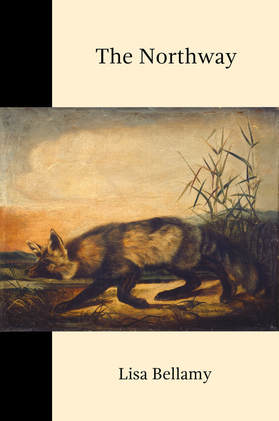 Reviewed by Judy Swann
Reviewed by Judy Swann
The Northway
by Lisa Bellamy
Terrapin Press
ISBN: 9781947896055, Paperback: 96 pages, August 2018
Here’s the question you will ask yourself as you read Lisa Bellamy’s The Northway: how does she do it? How does she convey such an upbeat—even goofy—persona when she is clearly an artist who has done some critical thinking? Hers is not insignificant, lah-de-dah verse from a superficial writer. It is skillful, deep, and for a squeamishly sober person like myself, shockingly delightful in its hilarity. Reading her work makes me feel the way I felt when the Dalai Lama came to Ithaca—light, sure, and bound to my fellow creature. For example, here she sings to a cow (55):
Cow Psalm
To the sly rebels, hoof-stompers, tail-switchers
quick-slapping the faces of farmers;
to the nippers, biters, udder-clenchers,haters of forced bovine production;
to the saboteurs pinning their milkmen
with slow, inexorable two-step waltzes tobarn walls;
These are cows that mourn their stolen sons. These are cows that spurn the luminous enticements of ground corn. These are heroic insurrectionists. As a reader, I revel in the poet’s love for them and sympathy with them.
Love for and sympathy with our animal relations is a tricky thing to pull off without the stink of sanctimony, but Bellamy does. There’s nothing treacly here and nothing our urban brethren can simply dismiss. She is on intimate terms with a whole catalog of creatures: bears, snakes, peepers, cats, calves, bobcats, goats, otters, crows, ticks, and pigeons, in ways that rival Apollinaire’s Beastiary. When she writes, ‘Once-content couples irritate each other / beyond the usual irritations,’ (“Woodchuck-a-Phobia,” 31) I remember my mother’s disdain for my father’s maniacal dishwashing, guests still at table. When she writes, ‘yes, to pissing long and yellow on domestic and civil order,’ (“To the Feral Pigs of Clinton County,” 50) I remember my grandmother who advised me, ‘If he’s a stuff-shirt, just pick up on one ham and pass your gas.’ When she writes of having negotiated a final settlement with a mole (“Note to the Caretaker,” 38), I think of the family of skunks that is tearing up my yard in search of grubs.
One of the volume’s best poems is the farm-to-table conceit “Eating Sadness” (30):
I select only fresh, locally-sourced sadness—
nothing tinned or flown in. Grilled mournfulness,marinated in a sauce of light self-scrutiny,
garnished with butter-rosettes of regret,brushed with hindsight? Delicious.
However, at times, only pan-seared drama will do.
This is how a bullish Buddhist transforms sadness. She peppers it with gentle jokes and pulls the energy from it. “Moping is bland,” she admonishes the reader, leaving us with something “caper-studded.”
Bellamy has received a Pushcart Special Mention, honorable mention in The Year’s Best Fantasy and Horror, and the Aurorean chapbook prize. A poem from this volume is up at the Academy of American Poets, a piece called “Wild Pansy” (7):
As a seed, I was shot out the back end of a blue jay
when, heedless, she flew over the meadow.
The pansy gives us the ignominious details. Then,
In a blink of God’s eye, I was an orphan. I trembled
where I fell, alone in the dirt.
We get a long series of liquids (“blink,” “trembled,” “fell,” “alone”) until we reach a condensation of dental stops: “dirt.” Bellamy’s narrators don’t have a categorical grudge against dirt as a concept, though. In the prose poem “Note to the Caretaker,” (38) one says of a mole “for his claws are godly spades and dirt his pleasing material and he knows his dirt contains nutrients.” Still, landing in the dirt is a low point for the wild pansy seed:
That first night
was a long night, early May and chilly, and I remember
rain filled my furrow. I called out for mercy—
Evolving the Psalmist who sang ‘Out of the depths I cry to you, Lord,’ the little seed of “Wild Pansy” cries out. A passing wolverine digging into the ground (like the skunks in my yard) pushes it further into the mud.
this was the gift of obscurity. I germinated, hidden
from the giants of earth, the jostling stalks,
And the poem ends in a triumph of consonance, and a plosion of positivity.
Here I am, kissable: your tiny, purple profusion.
With its keen eye and impeccable phrasing, Lisa Bellamy’s The Northway gives us good-natured laughter, the kind of feeling you get from a Masterpiece Theater series…and it is ever so much more respectable and rewarding than a binge-watch.
About the reviewer: Judy Swann is the orphaned daughter of decent Midwestern people. She is a poet and essayist who publishes fairly frequently both in print and online. She has a book of poetry, Fool, forthcoming from Aldrich Press in 2019 and a book of essays on the cartoon hero Stickman coming out from Young Bros in November.